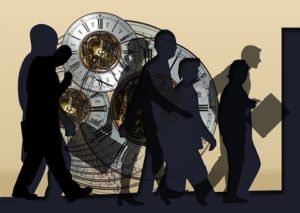There is a resource you have that is far more precious than your money. It is a resource that is universally nondiscriminatory and fairly distributed. Everyone has the same amount every day. Everyone’s supply is renewed every single day he or she is alive. It can be spent or wasted but can never be saved or returned to you. It is, of course, time. How precious is it? Reportedly, the dying words of Queen Elizabeth I were these: “All my possessions for a moment of time.”
You can live without money, but when your time runs out, you are finished! You have the same amount of this valuable resource that everyone else has, 60 seconds in a minute, 60 minutes in an hour, 24 hours in a day and 365 (or 366) days in a year. That means everyone has 31,536,000 seconds or 525,600 minutes every year. No one gets more no matter how much money or power they have.

But then why do some seem to get so much more done and be such amazing producers? The answer is, of course, that some are better stewards of their time.
So, let’s focus on being good stewards of this precious and limited commodity, our time.
We have all heard that old proverb (perhaps from Benjamin Franklin), “time is money.” Many are paid “by the hour.” Another old saying is, “Lost time is never found.” Time is also referred to as a gift, which it certainly is. The key to your future quite literally lies in the way you spend the time you have been given. How you handle, or are a steward of, your time has a major impact on your ability to earn money, the depth and success of your personal relationships, and even your overall health.
God agrees. God made us to live in time, to be limited by time and to enjoy the time He gives us.
We live with limited time – it is short and uncertain
We were created conscious of time and most view time as a brief and uncertain commodity. God gave us limited years and made us conscious of that by making us conscious of eternity.
Ecclesiastes 3:11
11 He has made everything beautiful in its time. He has also set eternity in the human heart; yet no one can fathom what God has done from beginning to end.
No one I know would argue that life seems brief. The older I have become, the faster time seems to pass and the faster my life seems to pass me by. God’s people know that feeling well and know we are made to feel the brevity of life.
Psalm 39:4-5
4 “Show me, LORD, my life’s end
and the number of my days;
let me know how fleeting my life is.
5 You have made my days a mere handbreadth;
the span of my years is as nothing before you.
Everyone is but a breath,
even those who seem secure.
Psalm 90:12
12 Teach us to number our days,
that we may gain a heart of wisdom.
James 4:14
14 Why, you do not even know what will happen tomorrow. What is your life? You are a mist that appears for a little while and then vanishes.
Because time is so brief and so important, we should use it wisely. How can we best use our time?
We are to make the best use of time – use it wisely and for God
Paul gave careful instructions to his young church in Ephesus that relate to the passage of time:
Ephesians 5:15-16
15 Be very careful, then, how you live—not as unwise but as wise,
16 making the most of every opportunity, because the days are evil.
Make the most of every opportunity. That is a basic time-use instruction. If you want to live wisely in God’s eyes, use your time and opportunities well. Paul understood that basic principle well. While he was in prison, he evangelized his jailers, sang praise songs to God, and wrote letters to his churches. Paul knew his time was limited and he obviously felt the pressure to reach as many people as he could during his life.

That means we need to be serious with the time God gives us and in that time we should work hard,
Proverbs 12:11
11 Hard work means prosperity; only a fool idles away his time.
(TLB)
That seems a bit harsh, calling an idle man a fool. But then the Lord’s judgment in the parable of the bags of gold in Matthew 25:14-30 was also harsh. The man who received the five bags “put his money to work.” He made five more bags for his Master. The one given two bags of gold also gained two more bags of gold for his Master. The third man, the one entrusted with the least, did not put the money to work, hid it, and was punished. Harsh? Yes, that was harsh, but it was also a necessary warning from God for us – use well what we have been given.
Nor do that harsh verse and the harsh parable stand alone. Many times the Word of God tells us to be diligent and alert, using a variety of stories, contexts and synonyms. Among others, see:
Proverbs 12:24
Proverbs 12:27
Proverbs 13:4
Proverbs 21:5
Mark 13:33
Ephesians 6:7-8
1 Timothy 4:15
1 Peter 1:13
1 Peter 4:7
1 Peter 5:8.
A good example can be found in:
Proverbs 6:10-11
10 A little sleep, a little slumber,
a little folding of the hands to rest—
11 and poverty will come on you like a thief
and scarcity like an armed man.
We would also be wise to put to good use the time we have been given to serve Him. We won’t necessarily gain additional hours of time back, but we will earn the reward of hearing, “Well done, good and faithful servant! You have been faithful with a few things; I will put you in charge of many things. Come and share your master’s happiness!”
The amount of time we are given is a mystery, and what God will bring for us in the hours and days that lie ahead is a mystery:
Proverbs 27:1
1 Do not boast about tomorrow,
for you do not know what a day may bring.
That makes the importance of starting without delay even more important.
So how do you start to practice time stewardship, what some call time management?
In the strictest sense, there is no such thing as time management, only time stewardship, because time passes regardless of what you do or do not do. You can’t manage it, you can only fill it, use it, or waste it. Time stewardship is the careful, wise, and Godly use of the time God gives you.
You need to accept the time given to you and decide what you will fill it with: something productive and Godly or something else, anything else. Quit making the usual excuses because they don’t work. You don’t need more time because you are “busy.” You don’t need a 26 hour day because your schedule is packed. Instead, you have filled your day and, if you were given a longer day you would probably fill the extra time with even more to do. It isn’t “time management” but poor scheduling and poor time stewardship that are your problems.

I will grant you that whatever you call it, whether time management, time stewardship, or something else, it feels the same. It feels like too much to do in the time that is available. It is annoying and stressful. Instead of being picky about naming the problem, let’s look at solving it.
In Part 2 we look at a few simple words as central to the solution. Those words are margin, distractions, and priorities. Priorities are often a part of the problem, but, oddly enough, they are also a huge part of the solution. Finish up this topic about the stewardship of time and get started with the rest of our lives as children of God.


About the Author


John Campbell has retired from a 40 year legal practice as a trial attorney in Tampa. He has served in multiple volunteer roles at Idlewild Baptist Church in Lutz, Florida where he met Jesus. He began serving as the Executive Director of the Idlewild Foundation in 2016. He has been married to the love of his life, Mona Puckett Campbell, since 1972.
